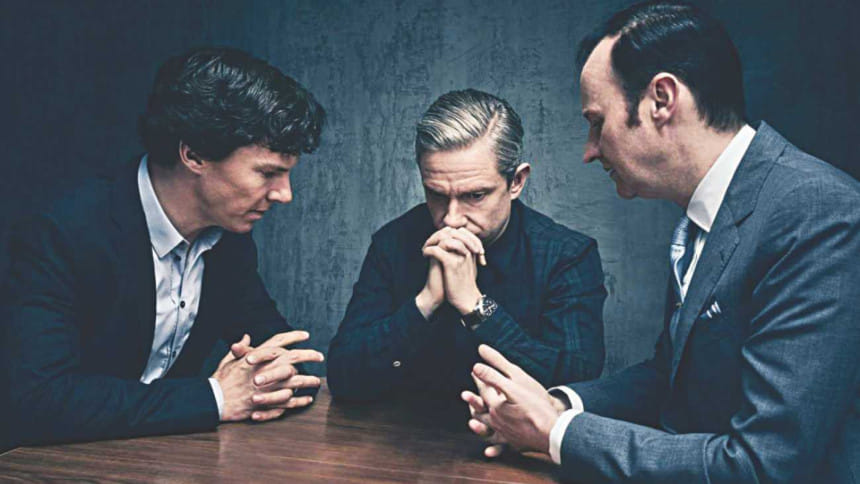Nothing Matters in Sherlock

The Sherlock Holmes stories are simple enough in subject matter: a detective, his friend, and the cases they solve and an arch-nemesis hovering in the background. Retain these elements and you can even set the stories in space. Sherlock's 21st century take was fresh but worked because at its core the show told Sherlock Holmes stories.
From 2014's Series Three and onwards, the core elements lost the writers' respect. Sherlock went from a show about characters solving puzzles to being a show about Sherlock the show. Intentional self-reference, in turn, then turned towards unintentional self-parody.
I liked Series Three a lot at the time. I re-watched it recently and it still holds up, but you can now clearly see where it really went wrong. I didn't mind that the first episode didn't offer a real resolution to Series Two's final cliffhanger: meta-mocking fan theories is a move that is cruel however you look at it but it was carried off in style and the show seemed to have earned it. And really, the reconciliation between Sherlock and John was poignant and fun. That this episode was followed by unabashed fan service was also a surprise but it was, also, a lot of fun and they even solved a decent case during the wedding. Looking back, it's obvious that the show had then decided to primarily be about the relationships between John and Sherlock but at the time I was satisfied.
It helped that the series finale was so spectacular, with Lars Mikkelsen's take on Charles Magnussen being in its own way as, uhm, memorable as Andrew Scott's Moriarty. However this same finale introduced the ridiculous premise of Mary as former gun-for-hire, and ended on an even stranger cliffhanger.
It took three years to finally resolve these new introductions to the plot and they were handled in the most bizarre ways possible: they were at once erased out of existence as actual drivers of the plot and yet constantly called back to in a way that killed the show's forward momentum.
The obsession with these resolved character arcs double-downed on the show's already present desire to look into itself for new plot ideas. Series Four was ultimately an exploration of Sherlock's relationships with those around him, particularly John. The trouble was that we didn't learn anything that we didn't already know. Of the new puzzles the series presented only episode two's actually worked, though again it hinged on calling back Mary to provide the final resolution. There was much revealed at the end of the series but it was a series of inconsequential plot twists that did not properly resolve what came before and did not have consequence for the future. The problem of the recent events being incredible (read: without credibility) is nothing next to this complaint.
This is a show where something seemingly earth-shattering can happen and then get subsequently erased or ignored in the rush to move to the next twist or quip. Without consequence a show has no tension and cannot be taken seriously as a story. Sherlock has become a beautifully-shot, brilliantly-performed series of set pieces, a film editor's dream, whose plot endlessly explores the same tired relationships and produces events that ultimately mean nothing even within the world of the show.
Why should it then mean anything to us?
Zoheb Mashiur is a prematurely balding man with bad facial hair and so does his best to avoid people. Ruin his efforts by writing to [email protected]

 For all latest news, follow The Daily Star's Google News channel.
For all latest news, follow The Daily Star's Google News channel. 



Comments